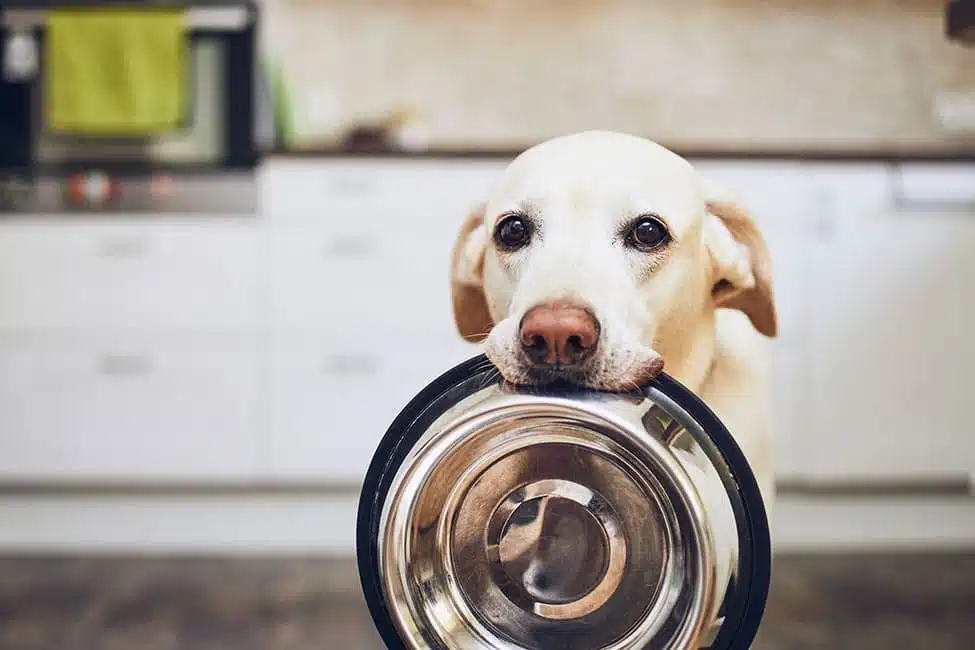
What Foods Can Dogs Not Eat?
Our furry best friends may seem more than happy to eat anything that they can get their paws on! But there are several foods dogs shouldn’t eat, including chocolates, grapes, macadamia nuts and more!
These foods can cause serious side effects like nausea, indigestion, vomiting and in severe cases, even death.
Luckily, avoiding the foods detailed below should be easy.
Practicing good habits like not leaving food out on the table, and dog-proofing their trash bins can make it very simple. We’ll provide you with a full list of dog foods to avoid, then we’ll go through the healthy foods that you could be feeding your dogs!
What Foods Are Toxic for Dogs?
Many of the most dangerous foods for dogs are things that we humans regularly eat, including chocolate, grapes, and certain nuts. If your pantry or fridge contains any of these harmful food items, it’s important to dog-proof these locations. And refrain from leaving these dangerous foods out where your dog can reach them.
In many cases, even if your dog does consume an item from this list, there’s a good chance that they will end up being ok. If your dogs eat anything from this list, we suggest monitoring them closely. Get in touch with your veterinarian as soon as possible to make sure that your dog won’t require medical intervention.
Below is our comprehensive list of foods dogs can’t eat:
Chocolate & Coffee
When discussing what dogs can’t eat, chocolate is often mentioned first. Chocolate is derived from cacao nuts—a nut that many other foods are also derived from, including coffee. Chocolate and coffee contain a family of compounds known as methylxanthines. When ingested by dogs, these can cause severe side effects, including:
- Vomiting
- Diarrhea
- Panting
- Excessive Thirst & Urination
- Hyperactivity
- Abnormal Heart Rhythm
- Tremors
- Seizures
- Death
If your dog happens to break into your snack jar and eats a couple of chocolates, or happens to take a slurp from your coffee cup, don’t panic quite yet!
Methylxanthines
Many dogs are capable of handling a low dosage of methylxanthines. This depends on their weight and the type of chocolate consumed. However, to make sure everything will be ok, check with your veterinarian immediately to tell them what happened. Then get their advice and make sure to monitor your dog for any of the symptoms listed above.
Also, keep in mind that of the different types of chocolates, baking chocolate tends to contain the highest amount of methylxanthines. Then followed by dark, milk and white chocolate respectively. Finally, extracts used in some sodas are derived from nuts containing methylxanthines, so it’s best to avoid these products as well.
Citrus
Citric acid can cause many problems for dogs. However, like most of the items on this list, the severity of symptoms depends on the amount consumed and the size of the dog. For some dogs, the citric acid contained in foods like lemons, oranges and limes can cause stomach irritation and possibly issues with their central nervous system. This also means pet owners should not give dogs acidic drinks like lemonade, as they contain just as much citric acid as the fruits themselves.
Grapes & Raisins
Grapes and raisins (which are just dried grapes) are extremely toxic to dogs for all breeds, sizes, and ages.
Symptoms include:
- Loss of Appetite
- Lethargy & Weakness
- Vomiting & Diarrhea
- Abdominal Pain
- Dehydration
- Increased Thirst
- Kidney Failure
Research has yet to determine the substance responsible for these negative effects. So it’s best to avoid any and all products containing grapes or raisins. Read more about the Toxic Effects of Grapes here. If your dog has ingested grapes or raisins, it’s important to seek treatment from your veterinarian as soon as possible.
Nuts
Although not all nuts are bad for dogs, some nuts, like macadamia nuts, are extremely toxic to them. If ingested, your dog may experience neurological problems, tremors, vomiting and weakness. Other nuts, like pistachios, can upset your dog’s stomach. If fed for an extended period, it can cause serious health conditions like pancreatitis. That said, all nuts contain high amounts of oils and fats, which can lead to obesity and other health issues. So they should generally be avoided for dogs. While peanuts and cashews are safe to feed dogs in small quantities, there are more nutritious dog treats available. Like Lucy Pet’s own dog treats made with real meat and high-quality, complex carbohydrates.
Milk & Dairy
Like humans, many dogs lack the enzymes to digest milk and other dairy products, leading to indigestion and diarrhea.
Common symptoms of lactose intolerance in dogs include:
- Loose Stools
- Gas
- Vomiting
- Abdominal Pain
- Diarrhea
That said, many dogs can safely consume small amounts of milk and dairy as a treat. But we recommend consulting your veterinarian whenever making a change to your dog’s diet.
Onions, Garlic, Chives
Onions, garlic, and chives can cause damage to your dog’s red blood cells, causing anemia, upset stomach, lethargy and more.
Other symptoms of eating these foods may include:
- Drooling
- Nausea
- Vomiting
- Elevated Heart Rate
- Weakness
- Pale Gums
It’s important to note, however, that these symptoms may take several days to manifest, so if you suspect your dog may have eaten these foods, please be sure to monitor your dog closely and stay in touch with your veterinarian. Read more about the dangers of Garlic and Dogs here.
Salty Foods
Salty foods or snacks can cause excessive thirst, and in severe cases, sodium ion poisoning.
Symptoms of excess salt consumption include:
- Vomiting
- Diarrhea
- Depression
- Tremors
- Elevated Body Temperature
- Seizures
Yeast
Because yeast rises, it can cause gas to accumulate in your dog’s digestive system. This can lead to painful side effects like stomach bloating. In severe cases, digesting yeast can cause the stomach to twist and contort, which is a life-threatening emergency that must be treated right away.
What’s more, ingesting raw dough containing yeast can produce ethanol and cause the dog to become drunk as a result.
Raw or Undercooked Meat
Although dogs are descendants of wolves, that doesn’t mean they can eat like wolves.
While it’s true that dogs can eat and digest raw or undercooked meat, these foods still pose some serious risks to your dog’s health.
Like humans, dogs are susceptible to dangerous bacteria like Salmonella and E. coli. If your dog consumes contaminated meat, they may experience severe side effects, including:
- Diarrhea
- Fever
- Vomiting
- Loss of Appetite
- Dehydration
- Elevated Heart Rate
- Lethargy
- Depression
- Skin Disease
- Shock
- Miscarriage
Additionally, bones from beef, chicken and other sources are unsafe for dogs. They can cause choking, cracking of teeth and even punctures in your dog’s stomach.
Many pet owners swear by feeding their dog a raw diet due to benefits like a shinier coat, higher energy levels, etc. But many of these benefits come as a direct result of feeding a high-fat diet—something that can be achieved without the dangerous side effects of consuming raw meat.
Finally, feeding your dog raw meat or a raw diet has the potential to create nutritional deficiencies or excesses that can lead to serious health issues down the road.
Diet is one of the most complicated components of healthy living (in both humans and dogs), which is why Lucy Pet has taken great care to develop balanced dog foods made with real meat to support optimal health and happy living!
Lucy Pet’s Formulas for Life Dog Food
When deciding what to feed your dog, it’s important to choose foods that are natural, healthy, and packed full of essential vitamins and minerals. Lucy Pet’s Formulas for Life Dog Foods were created with the help of nutritional experts to promote optimal gut health and a strong immune system.
Our dog foods not only contain real meat but also our proprietary P.B.F Prebiotic Fiber Blend designed to create a healthy balance in your dog’s digestive tract. Based on 40 years of research and studies by the renowned scientist and expert in animal nutrition, Dr. George C Fahey, the P.B.F blend contains a superfood blend of high-quality fiber sources like quinoa, flaxseed, pumpkin, and more.
In addition to fostering gut health and a healthy immune system, Lucy Pet’s Formulas for Life™ also provide several other key benefits, including:
- Improved Gut Health
- Healthy Immune System
- Antioxidant Nutrients
- High-Quality Energy
- Healthy Heart
- Healthy Eyes
- Shiny Coat
- Stronger Muscles
Lucy Pet’s dog foods are formulas you can depend on and feel proud to feed your furry best friend!
Our Chicken, Brown Rice & Pumpkin Limited Ingredient Dog Food
Chicken, Brown Rice, and Pumpkin Limited Ingredient Diet Formula combines real chicken and brown rice sourced from the USA to provide dogs with clean, sustainable energy. Pumpkin is then added to aid in healthy digestion. This formula is ideal for dogs with food sensitivities.
Our Duck, Pumpkin & Quinoa Dog Food
Lucy Pet’s Duck, Pumpkin, and Quinoa dog food formula features premium duck meat and absolutely no duck by-products. It also features delicious pumpkin, a nutritional powerhouse packed with fiber for healthy digestion. The last ingredient, quinoa, is a digestible seed rich in protein and essential amino acids.
Our Duck and Potato Limited Ingredient Dog Food
If your dog has food sensitivities, consider Lucy Pet’s Duck and Potato Limited Ingredient Diet. This formula is made with a single source duck protein and limited carbohydrate sources.
Like all Lucy Pet dog foods, our Duck and Potato Limited Ingredient Diet uses real duck meat. It’s a premium protein, perfect for keeping your dog healthy and strong. Read more about the Benefits of Duck here! We then blend this protein with whole fresh potatoes and sweet potatoes. These are high-quality sources of dietary fiber, minerals and vitamins.
Our Salmon, Pumpkin & Quinoa Dog Food
Lucy Pet’s Salmon, Pumpkin, and Quinoa Formula features real salmon as the first ingredient. This premium protein is then combined with other proteins, complex carbohydrates and fiber sources (like chickpeas, quinoa, and pumpkin) to help promote gut health, great energy and overall well-being.
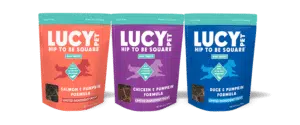
Lucy Pet’s Healthy & Natural Dog Treats
We also offers a variety of healthy and nutritious dog treats perfect for training or rewarding your furry friend for good behavior. Lucy Pet’s dog treats are made with natural, real, premium proteins like duck and chicken, in addition to high-quality fiber and carbohydrate sources. Just like our Formulas for Life™ Dog Food!
Our treats are also grain-free and contain limited ingredients. This makes them ideal for dogs who may have food sensitivities.
Shop Lucy Pet Today!
We hope you’ve found this list of what not to feed dogs useful! We also hope that you will consider everything Lucy Pet has to offer when making diet choices for your furry friends!
All of our products can be conveniently purchased online, and if you’re located within the continental US, shipping is 100% FREE!

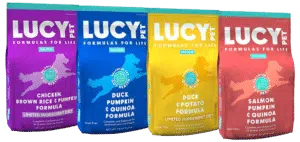
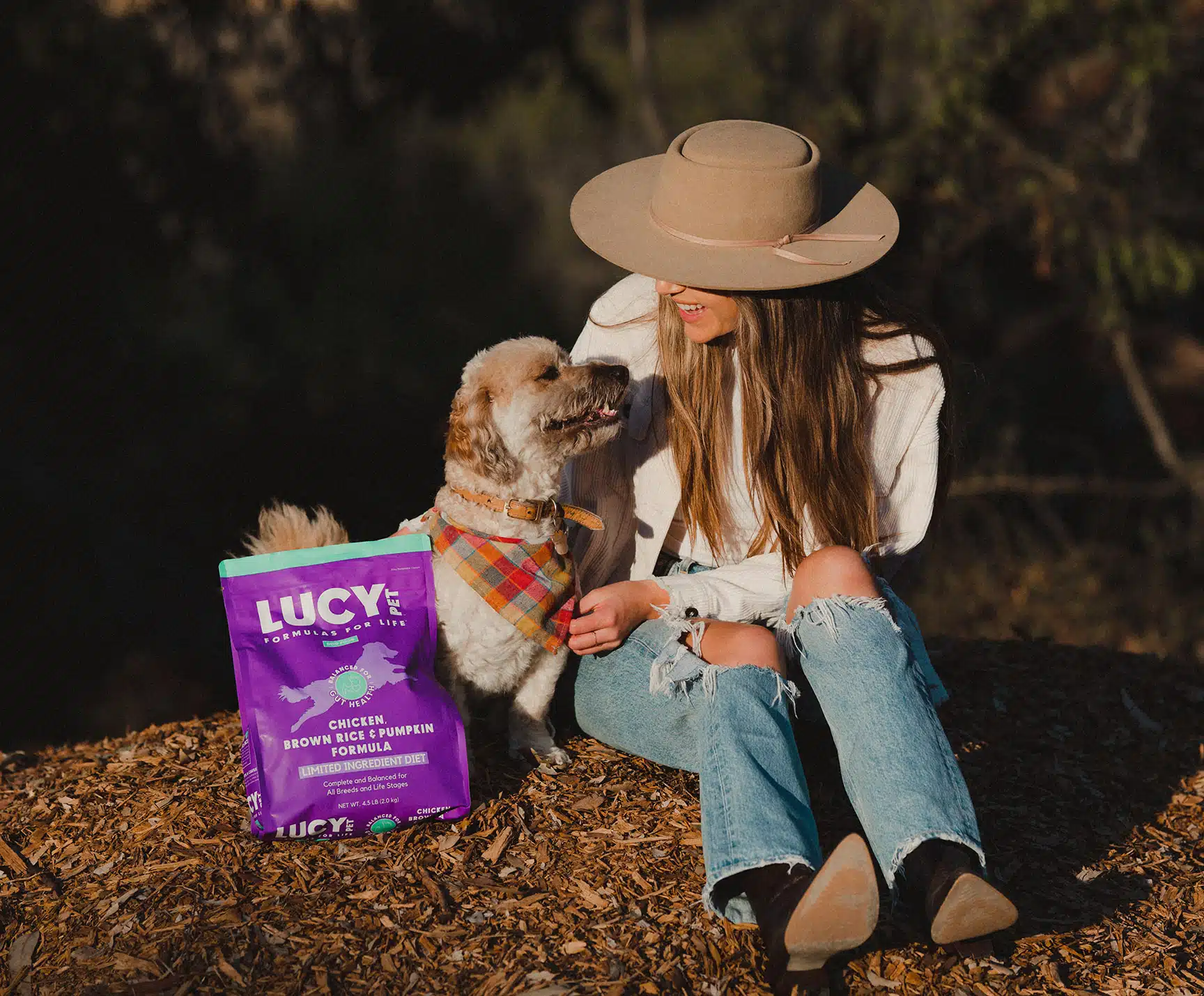

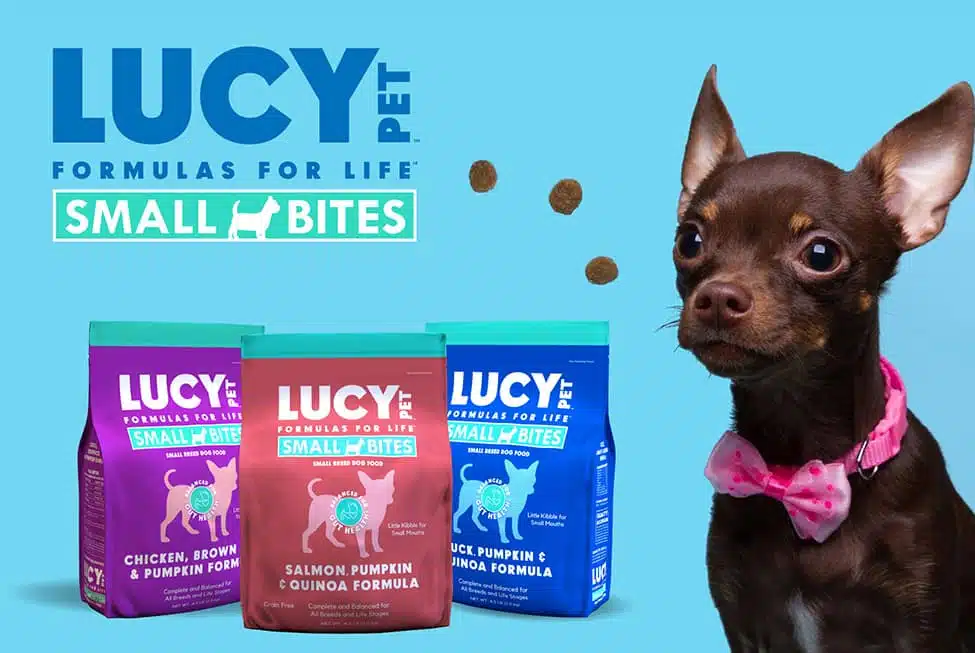


Leave A Comment
You must be logged in to post a comment.